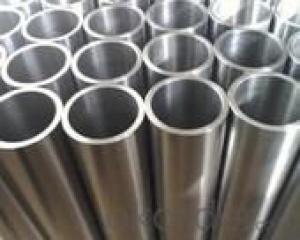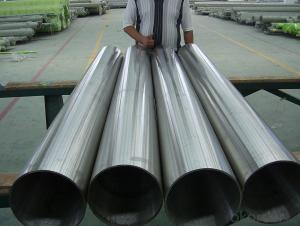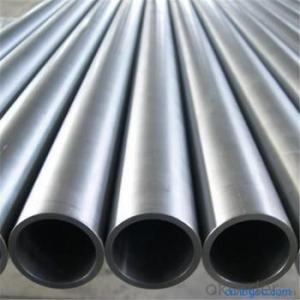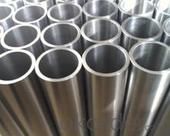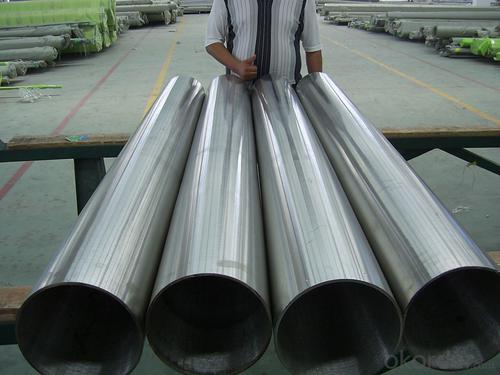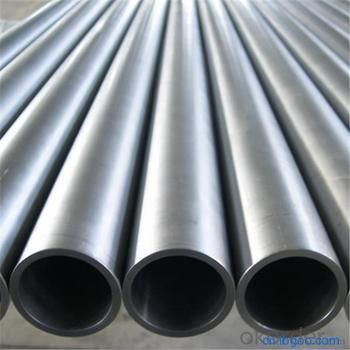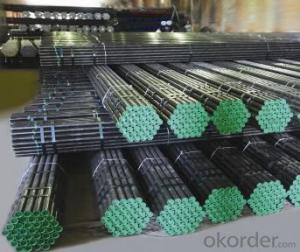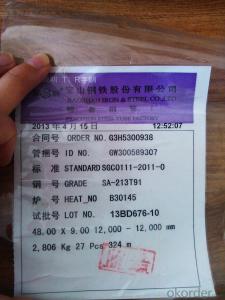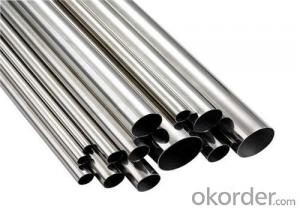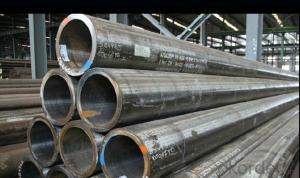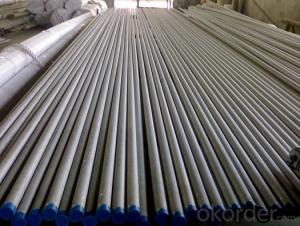ASTM A213 T91 boiler tube 32
- Loading Port:
- Shanghai
- Payment Terms:
- TT OR LC
- Min Order Qty:
- -
- Supply Capability:
- 30000 kg/month
OKorder Service Pledge
OKorder Financial Service
You Might Also Like
Alloy pipe stock grade A335P11/P22/P12/P91/P92/P9/P5 A213 T11/T22/T12/T91/T91/T9/T5
T91 alloy pipe is America national tree like ridge and America combustion new martensitic heat-resistant steel engineering company metallurgical materials laboratory research work. It is to reduce the carbon content of 9Cr1MoV steel on the basis of the content of sulphur, phosphorus, strictly limit the vanadium, niobium, adding small amount of alloying elements.
The number of K90901 T91 alloy tube
T91 alloy tube
T91 alloy pipe specifications: 8-1240 x 1-200mm
Overview of T91 alloy tube:
T91 alloy tubes for ferrite and Olympic alloy steel seamless steel tube boiler, overheating and heat exchanger belongs to (ASTM A213 / A213M-07a)
Use:
For low and medium pressure boiler (work pressure is generally not more than 5.88Mpa, the operating temperature at 450 DEG C) of the heating surface tube; used for high pressure boiler (work pressure is generally above 9.8Mpa, operate at a temperature of 450 DEG to 650 DEG C between) the heating surface tubes, economizer, superheater, reheater, petrochemical industrial pipe.
Heat treatment of T91 alloy tube:
The final heat of T91 treatment for normalizing and high temperature tempering, normalizing temperature 1040 C, the holding time of not less than 10 min, the tempering temperature is 730 to 780 DEG C, the heat preservation time is not less than 1h, the final heat treatment on Microstructure of tempered martensite
- Q: Can steel pipes be used for wastewater disposal?
- Indeed, wastewater disposal can be accomplished using steel pipes. Owing to their robustness, strength, and corrosion resistance, steel pipes find widespread application in wastewater systems. They are capable of withstanding the substantial pressure and flow rates commonly encountered in wastewater scenarios, efficiently conveying it to treatment plants or other disposal sites. Moreover, steel pipes can be enhanced with coatings or linings that offer additional safeguard against corrosion or chemical reactions with the wastewater, further enhancing their durability and efficacy in wastewater disposal.
- Q: Are steel pipes suitable for underground drainage systems?
- Indeed, steel pipes prove to be a fitting choice for underground drainage systems. The multitude of qualities possessed by steel pipes contributes to their popularity in this field. Firstly, their robustness and endurance enable them to withstand high levels of pressure and heavy loads. Moreover, steel pipes are resistant to corrosion, which prolongs their lifespan and reduces the need for frequent maintenance or replacement. Furthermore, steel pipes possess the advantage of adaptability and versatility in various soil conditions. They can be easily customized to match the specific requirements of the drainage system, encompassing different diameters and lengths. Additionally, steel pipes can be welded together, ensuring a secure and tight connection that effectively prevents leakage and the infiltration of groundwater. Another benefit of utilizing steel pipes in underground drainage systems lies in their capability to handle a wide range of temperatures. Their resistance to extreme heat or cold renders them suitable for diverse climates and environments. Nevertheless, it is important to acknowledge that steel pipes can be more costly compared to alternative materials such as PVC or HDPE pipes. Additionally, their weight and installation process may pose challenges, necessitating specialized equipment and expertise. In conclusion, steel pipes provide a dependable and long-lasting solution for underground drainage systems, particularly in regions where durability and strength are vital considerations.
- Q: What are the different end finishes for steel pipes?
- Different end finishes are used for steel pipes, depending on their intended use and specific requirements. Some common types of end finishes for steel pipes include: 1. Plain End: This is the most basic and widely used end finish. The pipe is cut square at both ends without any additional treatment or threading. Plain end pipes are typically used for low-pressure applications or when welding methods will be used for connection. 2. Beveled End: A beveled end finish involves cutting the pipe at an angle, usually 30 or 37.5 degrees. This makes welding easier and creates a stronger joint. Beveled end pipes are commonly used for butt-welding applications, where two pipes are aligned and welded together at the beveled ends. 3. Threaded End: In this end finish, the pipe is threaded at both ends to allow for easy connection with threaded fittings or couplings. Threaded end pipes are commonly used in plumbing and gas distribution systems, as well as for applications that require frequent disassembly and reassembly. 4. Coupled End: Coupled end finishes involve the installation of couplings or connectors at each end of the pipe. This allows for quick and easy connection of pipes without the need for additional threading or welding. Coupled end pipes are often used in oil and gas pipelines or in applications where rapid installation is required. 5. Grooved End: A grooved end finish involves cutting grooves into the pipe's ends and using mechanical couplings or fittings to join the pipes together. This type of end finish is commonly used in fire protection systems and for large-diameter pipes that require efficient assembly. 6. Flanged End: Flanged end finishes involve attaching flanges to the pipe ends. These flanges can be bolted together to create a secure and leak-proof connection. Flanged end pipes are commonly used in applications that require easy disassembly and reassembly, such as in chemical plants or refineries. It's important to consider factors such as the application, required joint strength, connection method, and compatibility with other system components when choosing an end finish for a steel pipe. Consulting a professional or referring to industry standards is recommended to ensure the correct end finish is selected for a specific application.
- Q: Can steel pipes be used in extreme weather conditions?
- Yes, steel pipes can be used in extreme weather conditions. Steel is known for its high strength and durability, making it suitable for a wide range of applications including construction, infrastructure, and transportation. Steel pipes are commonly used to transport fluids and gases in various industries, and they are designed to withstand harsh environmental conditions, including extreme temperatures, high pressures, and corrosive environments. In extreme weather conditions such as extreme heat, cold, or heavy rain, steel pipes can maintain their structural integrity and functionality. Additionally, steel pipes can be coated or insulated to provide additional protection against corrosion and to maintain desired temperatures. Overall, steel pipes are a reliable choice for use in extreme weather conditions due to their strength, durability, and resistance to various environmental factors.
- Q: How are steel pipes used in the manufacturing of furniture and appliances?
- Due to their strength, durability, and versatility, steel pipes find widespread use in the production of furniture and appliances. In furniture manufacturing, they are commonly employed to construct the frames and structures of various pieces, including chairs, tables, and beds. Serving as the primary support system, these pipes ensure a sturdy and dependable foundation for the furniture. In appliances, steel pipes serve multiple purposes. They are frequently utilized to create the internal framework and bear the weight of kitchen appliances such as stoves, ovens, and refrigerators. Additionally, steel pipes are commonly found in washing machines, dryers, and dishwashers, facilitating the transportation of water and other fluids throughout the appliance. Moreover, steel pipes are essential in the manufacture of outdoor furniture and equipment that require weather resistance and durability. To safeguard against rust and corrosion, these pipes are often coated with protective materials, thus ensuring the longevity of the furniture and appliances. In conclusion, steel pipes play a vital role in the production of furniture and appliances, providing the necessary strength and support. Their versatility allows for various applications, making them an indispensable component in the manufacturing process of these goods.
- Q: Can steel pipes be used for firefighting systems?
- Yes, steel pipes can be used for firefighting systems. Steel pipes are commonly used for their durability and resistance to high temperatures, making them suitable for transporting water and other fire suppression agents. They are typically used in larger commercial or industrial buildings where the fire protection system requires a higher flow rate and pressure. Steel pipes also have the advantage of being able to withstand external forces and impacts, ensuring the integrity of the firefighting system. Additionally, steel pipes can be easily connected, making them convenient for installation and maintenance purposes. However, it is important to ensure that the steel pipes used for firefighting systems are properly treated to prevent corrosion and rusting, as this can compromise their effectiveness in an emergency situation. Regular inspections and maintenance should be conducted to ensure the reliability and functionality of the steel pipes within the firefighting system.
- Q: Can steel pipes be used for bridge piling?
- Yes, steel pipes can be used for bridge piling. Steel pipes are commonly used for bridge piling due to their strength, durability, and resistance to corrosion. They provide a strong foundation for bridges, ensuring stability and longevity.
- Q: What are the different grades of steel used in pipe manufacturing?
- The different grades of steel used in pipe manufacturing vary depending on the intended use and specific requirements. Some common grades include carbon steel (such as ASTM A106 or API 5L), alloy steel (such as ASTM A335), stainless steel (such as ASTM A312), and duplex steel (such as ASTM A790). These grades have different chemical compositions and mechanical properties to suit various applications in industries like oil and gas, construction, and plumbing.
- Q: How do steel pipes perform in high-temperature applications?
- Steel pipes perform well in high-temperature applications due to their high thermal conductivity and excellent resistance to heat. They can withstand extreme temperatures without deformation or structural failure, making them suitable for transporting hot fluids or gases in industrial processes.
Send your message to us
ASTM A213 T91 boiler tube 32
- Loading Port:
- Shanghai
- Payment Terms:
- TT OR LC
- Min Order Qty:
- -
- Supply Capability:
- 30000 kg/month
OKorder Service Pledge
OKorder Financial Service
Similar products
Hot products
Hot Searches
Related keywords
